
This page is part of © FOTW Flags Of The World website
Dictionary of Vexillology: Appendix VIII
Crosses in Heraldry
Last modified: 2024-09-14 by rob raeside
Keywords: vexillological terms |
Links: FOTW homepage |
search |
disclaimer and copyright |
write us |
mirrors
On this page:
- Cross Botonny (or Bottonny or Bottonn�e
- Cross-Canton�e (or Cantoned)
- Cross-clech�e
- Cross-Counterchanged
- Cross Counter-Quartered
- Cross-Couped
- Cross Crosslet
- Cross Fleury Fitchy
- Cross-Fitchy
- Cross Fleury (or Flory, Floretty or Fleuronny)
- Cross Formée
- Cross Gringolée
- Cross Gyronny
- Crosslet
- Cross Moline
- Cross of Calvary (or Cross of Crucifixion)
- Cross Patt�e (or Pat�e, Patty or Paty)
- Cross Pomel
- Cross Potent
- Cross Potent Canton�e
- Cross Tau
- Cross-Voided
- Latin Cross
The following terms may be encountered when referring to a cross in a flag, or banner of arms, or heraldic flag of some other description.
Cross Botonny (or Bottonny or Bottonn�e)
The heraldic term for a cross that does not usually extend to the edges of a shield, flag, canton or panel, but whose ends are formed by three discs � a trefoil or treflee cross (see also �cross 2)�, �disc� and �trefoil�).

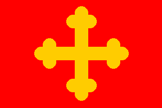
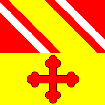
From left: Example; Flag of the Order of St Maurice, Italy (fotw); Flag of Massonnens, Switzerland (fotw)
Cross-Canton�e (or Cantoned)
The heraldic term for a cross which may or may not extend to the edges of a shield, flag, canton or panel, but which has four further crosses (or other charges) arranged around it � a cross cantoned (see also �canton 3)�, �cantoned 1)�, �cross 1)�, �cross patt�e� and �cross potent�)




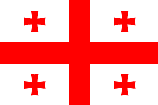
From left: Crosses-Canton�e examples; Flag of
Tianeti, Georgia (fotw); The Kingdom of Jerusalem c1200 (CS); National Flag of
Georgia (fotw)
Please note as may be seen in the illustrations above, various types of cross can be used to make up a cross canton�e, and that a Jerusalem Cross (constructed of a cross-potent and four Greek crosses or of five crosses-potent) is one specific type.
Cross-clech�e
The heraldic term for a cross that does not generally extend to the edges of a shield, flag, panel or flag, but whose arms are in the form of (usually irregular) lozenges or fusils � a cross-lozengy or cross-fusilly (see also �cross 2)�, �fusil� and �lozenge�).

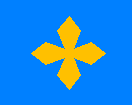


from left: Examples (2); Arms and Flag of Mogilany, Poland (Jarig Bakker)
Cross-Counterchanged
The heraldic term for a cross that generally extends to the edges of a shield, panel, banner of arms or flag, and which is divided along its horizontal and vertical centre-line with the tinctures of the field and cross usually (but not exclusively) alternating in adjacent quarters - a counterchanged cross - but compare with cross gyronny (see also �counterchanged�, �cross 2)�, �dominican cross�, �quarter 2)� and �tincture�).



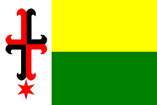

Flag and Arms of Zapre�ić, Croatia (fotw); Flag of
Davos, Switzerland (fotw); Flag and Arms of
Tursko, Czechia (fotw)
Notes
a) A cross whose centre is obscured by a charge (as illustrated below) could be described as either a cross-counterchanged or a cross gyronny, however, the term �cross quartered� has now come into use - see �cross quartered�.
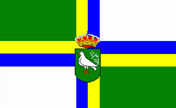
Flag of Palomares del R�o, Spain (Klaus-Michael Schneider)


Flag of Zurrieq, Malta (fotw): Flag of
Villars-Sainte-Croix, Switzerland (fotw)
Cross Counter-Quartered
1) See �cross counter-changed� in �appendix 8�.
2) The term that may also be used when the centre of a cross of this general
type is obscured as illustrated below.- see �cross gyronny� in �appendix 8�.



Flag and Arms of Zapre�ić, Croatia (fotw); Flag of Palomares del R�o, Spain (Klaus-Michael Schneider)
Cross-Couped
A heraldic term sometimes used when a cross (either plain or decorated) does not extend to edges of a shield, banner of arms or flag (see also �couped 2)� and �Greek cross�).

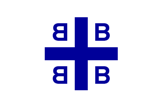

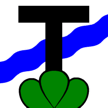
Example; Putative Flag of Constantine the Great c325AD (fotw);
Arms and Flag of Treiten, Switzerland (Wikipedia & fotw)
Please note that, unless referring to a plain cross, this term is always accompanied by a further description, for example a �cross tau couped� (as illustrated above), or �cross crosslet couped� as shown in the following definition.
Cross Crosslet
The heraldic term for a cross which does not usually extend to the edges of a shield, flag canton or panel, but whose arms have a short transverse bar inserted (see also �cross 2)�).

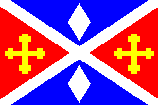

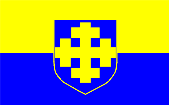
Example; Flag of Echt-Susteren, The Netherlands (fotw);
Arms and Flag of Slupca, Poland (fotw)
Cross-Fitchy
The heraldic term for a cross which does not usually extend to the edges of a shield, flag, canton or panel, and which may have plain or decorated ends, but whose vertical arm comes to a point at its base (see also �cross 2)� and �cross of Santiago�).



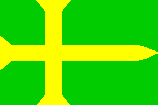
Flag of Bernissart, Belgium (fotw); Flag of Aviny�, Spain (fotw)
Please note that, unless referring to a plain cross, this term is always accompanied by a further description, for example a �cross crosslet fitchy�.
Cross Fleury Fitchy
See �cross of Santiago�.


Arms and Flag of Torr�o, Portugal (fotw)
Cross Fleury (or Flory, Floretty or Fleuronny)
The heraldic term for a cross which does not usually extend to the edges of a shield, flag, canton or panel, but whose ends are formed by fleur-de-lis � a fleur-de-lis or fleury cross, avis cross, or cross of calatrava (see also �avis cross�, �cross 2)�, �Dominican cross�, �cross of Calatrava�, �fleur-de-lis� and �fleury�)


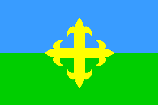
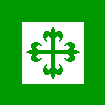
From left: Example; Suggested Flag of the Avis Order, Portugal (fotw); Flag of Almagro, Spain (fotw); Flag of
Guriezo, Spain (fotw); Flag of The Portuguese Legion c1928 � 1974 (fotw)
Cross Gringolée
See �snakehead cross�.

Cross Gyronny
The heraldic term for a cross that may or may not extend to the edges of a shield, flag or panel, but is composed of two tinctures meeting at the centre point and alternating either side of the vertical and horizontal meridians (thus giving it a three-dimensional appearance) � a gyronny cross - see �gyronny� and compare with �cross counterchanged� in �appendix VIII� (also �Dominican cross�, �faceted� and �tincture�).

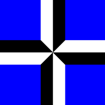
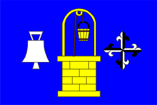
Example; Flag of Safiental, Switzerland (fotw); Flag of Studnice, Czechia (fotw)
Notes
a) Unless describing a plain cross throughout, this term should always be
accompanied by a further description, for example a �cross fleury gyronny couped�.
b) A cross whose centre is obscured by a charge (as illustrated below) could be described as either a cross gyronny or a cross-counterchanged, however, the term �cross quartered� has now come into use - see �cross quartered�.
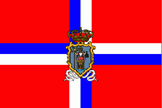
Flag of Santa Cruz de La Palma, Spain (Klaus-Michael Schneider)
Crosslet
1) The heraldic term used when two or more crosses are borne (couped) on the same coat � but see �cross-canton�e� and �cross-crosslet� in �Appendix VIII:� (also �couped�).
2) A term also (incorrectly) used to describe a single small cross.
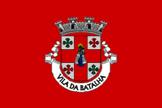


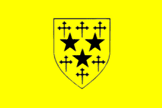
Flag and Arms of Batalha, Portugal (fotw); Flag of
�dena, Spain (fotw); Flag of Somerville College Oxford, UK (fotw)
Cross Moline
The heraldic term for a cross which does not usually extend to the edges of a shield, flag, canton or panel, but whose ends are split into two curved pieces � an anchor or moline cross (see also �cross 2)� and �snakehead cross�).


Example, Flag of Ann�ullin, France (fotw)
Cross of Calvary (or Cross of Crucifixion)
The heraldic term for a Latin cross that does not usually (although it may) extend to the edges of a shield, flag, panel or flag, but which is mounted on three steps steps � a cross of crucifixion, a calvary cross or calvary (see also �Latin cross�).

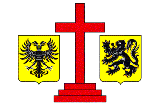
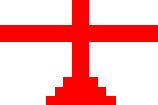
From left: Example; Flag of Geraardsbergen, Belgium (fotw); Flag of
Fulleda, Spain (fotw)
Cross Pomel (Pom�e, Pommetty or Pommelly)
The heraldic term for a cross which does not usually extend to the edges of a shield, flag, canton or panel, but whose arms finish in a roundel (see also �cross 2)�, �pommeled� and �roundel 3))�

![[Lagoa Portugal]](../images/v/vxt-d2597.gif)
![[Lagoa Portugal]](../images/v/vxt-d2599.gif)
![[Lagoa Portugal]](../images/v/vxt-d2598.gif)
Example (Parker); Flag of Lagoa, Portugal (S�rgio Horta); Arms and Flag of Santa Cruz, Portugal (Klaus-Michael Schneider)
Cross Patt�e (or Pat�e, Patty or Paty)
The heraldic term for a cross that may or may not extend to the outer edges of a shield, flag, canton or panel, whose arms are generally (but not exclusively) flat-ended but which is wider at its outer ends than it is in the centre. The arms can be straight-sided or curved throughout their length, or they can be straight-sided and parallel until being flared at their outer end � a cross form�e, form� or formy, a patt�e, pat�e, patty or Paty cross, a form�e, form� or formy cross, or an iron, Hanseatic, Hansa, cavalier or cavalier�s cross � but see �Maltese cross�, �rounded cross� (also �cross 2)� and �Cross of the Order of the Knights of Christ�).

![[Wallis & Futuna]](../images/v/vxt-d592.gif)
![[Guernsey civil ensign]](../images/v/vxt-d592a.gif)
![[Cr. Jensen houseflag]](../images/v/vxt-d592b.gif)
From left: example; Flag of Wallis & Fortuna; Civil Ensign of Guernsey; House flag of Chr. Jensen, Denmark (fotw)
Cross Potent (or Potence)
The heraldic term for a cross which does not usually extend to the edges of a shield, flag, canton or panel, but whose arms terminate in a transverse bar � a cross potence, or potent, or a crutch or Teutonic Cross (see also �cross 2)� and �cross-canton�e� and �potent 2)�).

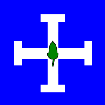
From left: Cross-Potent example; Flag of Goumo�ns-la-Ville, Switzerland (fotw)
Cross-Potent Canton�e
See �Cross Potent� and �Cross-Canton�e� in �appendix VIII�.

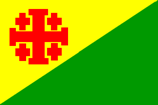

Example; Flag
and Arms of Niawier, The Netherlands
Cross Tau
The heraldic term for a cross that may or may not extend to the edges of a shield, flag, canton or panel, but in which the vertical arm does not extend above the horizontal thus creating a letter �T� - a tau cross, Cross of St Anthony or Saint Anthony's Cross, and in some Christian denominations, also an Advent Cross.

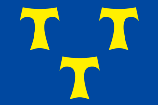

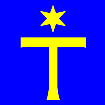
Flag of Lede, Belgium (fotw); Arms of Nossa Senhora da Gra�a dos Degolados, Portugal (Klaus-Michael Schneider); Flag of St Ant�nien-Ascharina, Switzerland (fotw)
Cross-Voided
The heraldic term for a cross that may or may not reach the edges of a shield, banner of arms or flag and may be either closed or open-ended, but from which the centre is removed so that the field may be seen through it (see also �cross of athletics� and �voided�)

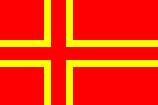

From left: example; Flag of the Mouvement Normand, France (fotw); Flag of De Haan, Belgium (fotw)
Notes
a) Unless referring to a plain cross, this term is always accompanied
by a further description, for example "a cross patt�e voided".
b) This term is sometimes (incorrectly used to describe a
Cross of the Order of the Knights of Christ as illustrated below � see �Cross of the Order of the Knights of Christ�.
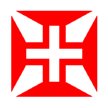
A banner of the Order of the Knights of Christ (fotw)
Latin Cross
The heraldic term for a cross that does not usually extend to the edges of a shield, flag, panel or flag, but whose horizontal arm is shorter than its vertical and which is set above the centre line � a long cross (see also �Greek cross� and �cross 2)�)

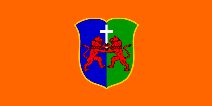

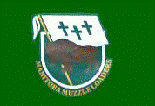


From left: example; Flag and Arms of Budin�cina, Croatia (Fame); Flag of the Muzzle Loaders of Manitoba, Canada;
Arms and Flag of Vila de Ala, Portugal (Antonio Martins)
Notes
1) Unless referring to a plain cross, this term should always
accompanied by a further description, for example a �Latin cross treflee� as
illustrated below.


Arms and Flag of Negoslavci, Croatia (fotw)
2) In vexillological terms a Latin cross throughout becomes an off-centred cross � see �off-centred cross 2)� (also �throughout�).
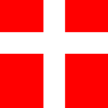
Flag of Thunstetten, Switzerland (fotw)
Introduction | Table of Contents | Index of Terms | Previous Page | Next Page